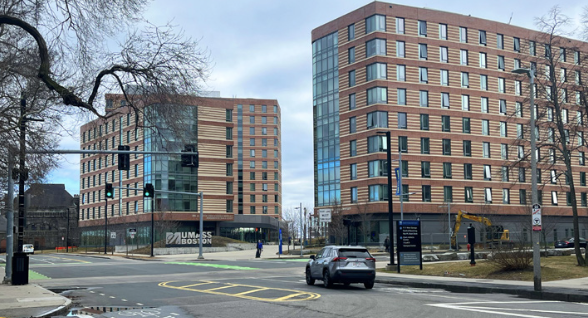
I love to complain about UMass Boston, but really, most of the campus is fine, if a bit outdated and labyrinthine—except for the Motley Residence Halls. While many of my experiences may be personal anecdotes, I’ve heard similar sentiments echoed repeatedly by other residents. Even before the move-in date, I and other students struggled to navigate the various housing websites, and I still struggle with these websites to this day: When I tried to pay my December housing bill early, I was double-charged because the website glitched and charged overdraft fees by the university.
Both the East and West Motley Residence Halls are constantly broken, and it was apparent as soon as I moved in. As soon as you walk in the rooms, it’s clear that they were poorly renovated; there’s paint all over the floor, some of the walls are damaged and poorly painted over instead of repaired, and things are already broken—for example, my friend’s window was broken and wouldn’t open. Around the day that I moved in, I submitted a work order to have my bed lowered because I had had surgery just a few weeks before moving and wasn’t able to comfortably jump up on the bed. This work order was never fulfilled, and I was never contacted about it.
As anyone who’s spent time in the residence halls knows, the elevators in particular are always broken. Recently, UMass Boston declared that all broken elevators were due to student misuse and implemented new rules, such as no more than eight students to an elevator and no holding the doors open. Curiously, the other elevators on campus rarely break, although they must get as much use, if not more, than the residence hall elevators. Surely if they break this often, and pretty much only in the East Residence Hall, administration could do something proactive to make the elevators break less. Instead, UMass Boston has decided to charge all students in both East and West for broken elevators if they can’t find the perpetrator.
Besides the obvious inconvenience, broken elevators are an accessibility issue—and sometimes hazardous—for the many disabled people living in both residence halls. Other accessibility issues include the constantly broken entrance doors. More often than not, either one or both sets of supposedly wheelchair-accessible doors to the residence halls don’t open when you press the button. This is an issue in other buildings on campus, but again, it seems that UMass Boston’s administration would rather continue to fix these issues or simply let them stay broken than correct the underlying issue, whatever that may be.
The inconsistent shuttle buses pose another accessibility issue. For many students, walking back and forth from JFK/UMass to the dorms simply isn’t possible. However, barely any shuttles run during weekends, and fewer run at night. Shuttles oftentimes just sit and idle at the Campus Center, even at times where there aren’t any classes—for example, at midnight on a Saturday. There have been times when I’ve come home from working a night shift and waited 45 minutes at JFK/UMass for a shuttle bus. When I emailed to mention the issue, I was told to file a support ticket, but no one ever followed up.
The list of broken features in the residence halls is endless. To name a few more: The fire alarms go off frequently, seemingly due to electrical issues; the fire alarms cause the elevators to turn off for hours; the heating is broken in both the summer and winter, and rooms frequently get as hot as 85 degrees—RAs instruct students to just wait it out; the doors to each room will randomly stop opening, or stop locking; many common room TVs are completely broken, and many common room couches are in shambles; the hot water turns off seemingly at random and is completely off during breaks, despite the dozens of students who still live on campus during this time; the Wi-Fi, which is actually the guest Wi-Fi because the student Wi-Fi doesn’t work and never has, also randomly turns off; and through it all, there is very little, if any, communication from UMass Boston.
The food is the most common complaint about the residence halls, and it goes beyond just mediocre quality. There’s a chronic lack of vegetarian and halal options, and the vegan options are confined to a small fridge in the corner. Ostensibly, you can ask for vegetarian and halal options at every station, but in practice, they’re almost always out of stock.
Most shocking is the incorrect signage throughout the dining hall, which can be life-threatening. A friend of mine, who is allergic to red meat, ate some food from a station which listed the meat as chicken only; he learned later that it was pork and had to go to the hospital when he started having a serious allergic reaction. If he hadn’t had his EpiPen on him, if he had caught the reaction later than he did, or if he had a more serious allergy, this could have been deadly. This was a seriously dangerous mistake to make and reflects the general carelessness that seems to plague the administration’s attitude toward the residence halls.
Yes, UMass Boston is a commuter school. That doesn’t mean that the university can completely ignore the many issues in the residence halls, and the hundreds of students that live, eat and work here. For upwards of $3,000 for a room, counting each roommate’s individual contribution, students deserve more.




















































